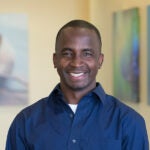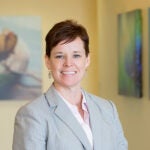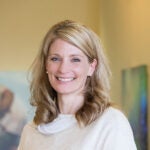Questions & Answers
What was your motivation for pursuing a DNP?

Cherno: Having come from a poor and developing country (The Gambia), I have always been passionate about improving the population health of rural and underserved communities.

Claudia: My motivation to complete a DNP was to increase my skill set in order to practice at the top of my license and to be able to make a greater impact on health.
What are the strengths of the Boise State program?

Jennifer: The Boise State University DNP Program has a well-rounded curriculum to prepare nurses for the continual challenges in health care delivery to all populations.

Cherno: The support throughout the program has been unlike anything I have experienced before from members of academic faculty.
What advice would you give to someone considering the DNP?

Claudia: A: Make sure it is the right time to embark on this endeavor. Pursuing a doctorate degree is all-encompassing. But, the program is amazing preparation for the most important and rewarding work that you will do!

Jennifer: A: I would tell any masters-level nurse that if they have ever considered a terminal degree, that they should seriously consider making it a Boise State DNP degree.
Why did you choose to pursue a DNP rather than a PhD?

Andrea: My primary interest is to improve patient care and safety through the application of sound scientific evidence at the bedside or in the clinical setting. The DNP degree bridges the gap between research and bedside, allowing me to work side-by-side with my PhD prepared colleagues to optimize patient outcomes.

Cherno: A: To fulfill my passion in improving population health, I knew I needed to have a much better understanding of how science influences clinical practice. I wanted to understand how organizational systems and leadership could influence healthcare quality and improve population health outcomes.
How has completing a Scholarly Project changed you?

Jennifer: I feel confident and competent to use the Scholarly Project framework for any best practice implementations I need to lead in my practice. I look at project requests and initiatives differently now — making sure that the project is well-founded in the literature, that there is need, that stakeholders are involved, and that evaluation and funding are built from the outset. This lends to rapid improvements in healthcare because it is based on good research and sound practice.

Andrea: The completion of the scholarly project has been a journey of personal and professional growth for me. I have had great mentors and supporters along the way, including Boise State School of Nursing faculty and peers. All of it has made a tremendous, positive difference in my career.

Claudia: The completion of the Scholarly Project has helped me identify what other countries and communities have done to help those with a mental illness and/or a substance use disorder who are in crisis. I plan to share that information with behavioral health stakeholders in my region so we can learn from the existing best practices and decrease our rate of suicide.
How has your Scholarly Project impacted the practice of nursing?

Jennifer: I am sharing my project and results at a national conference and expect that it will encourage and provide a framework for other hospitals looking to employ Faith Community Nurses (FCN) within care transition programs. I think locally my hospital will have the opportunity to integrate our FCN network further into hospital – community outreach operations.
What inspired you to choose the Scholarly Project you did?

Andrea: My inspiration stemmed from a conversation I had with the medical director of the cardiopulmonary rehab program at my hospital. We saw patients return to cardiac rehab after experiencing a second cardiac event. In talking with these patients, it was evident that the majority of patients did not remain compliant with their learned health behaviors. We started talking about a sustainability project and my DNP Scholarly Project was the result.

Cherno: From the start, I knew that it was the right clinical intervention and something that would ease the practice of the nurses I worked with and improve patient outcomes.
View Scholarly Projects
The centerpiece of the DNP program is the Scholarly Project. Our graduates have directly impacted nursing education, refined best practices within their health systems and colleges, and developed innovation programs to augment patient care. For examples of projects completed by our alumni, we invite you to view Scholarly Projects.